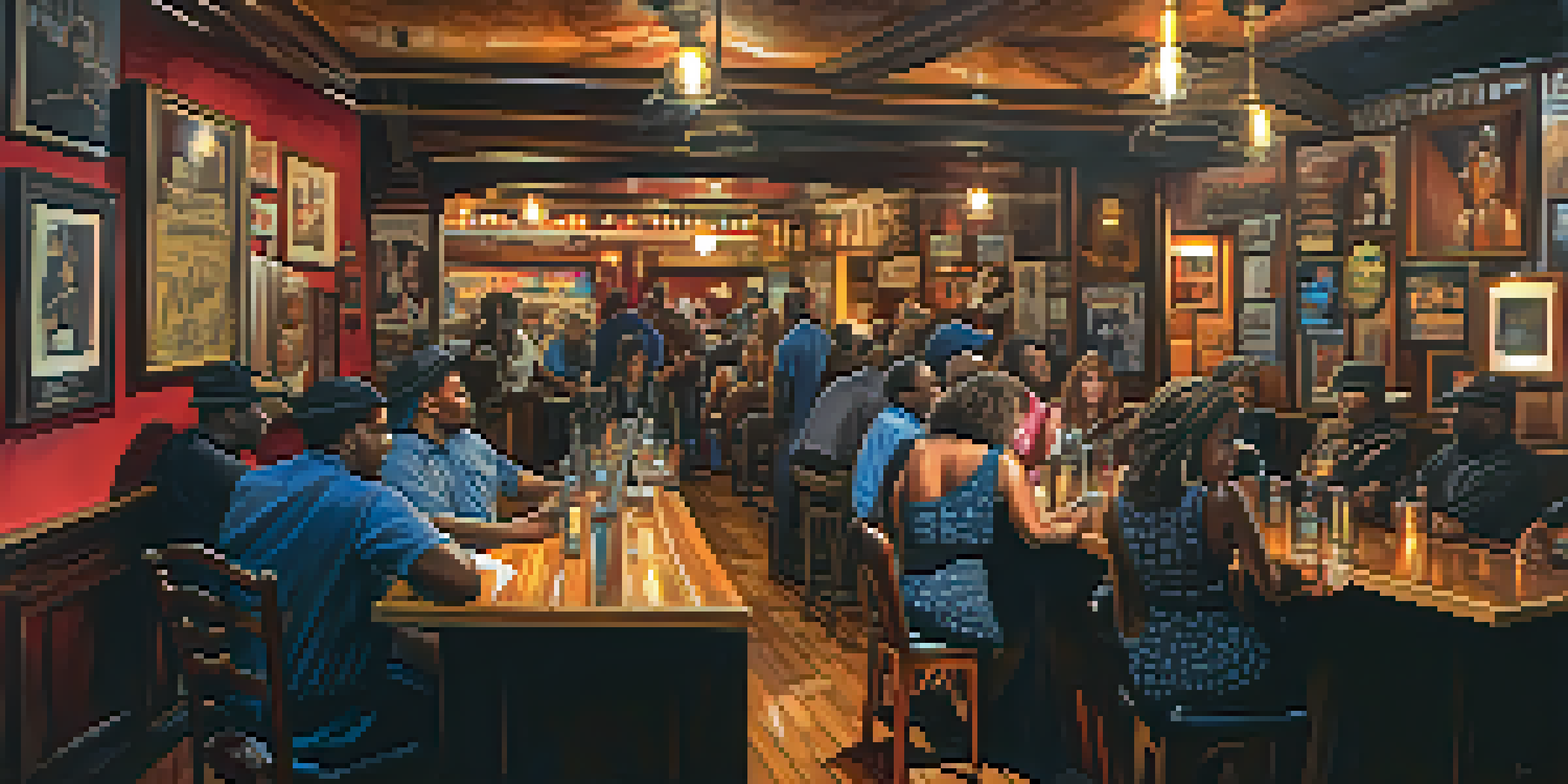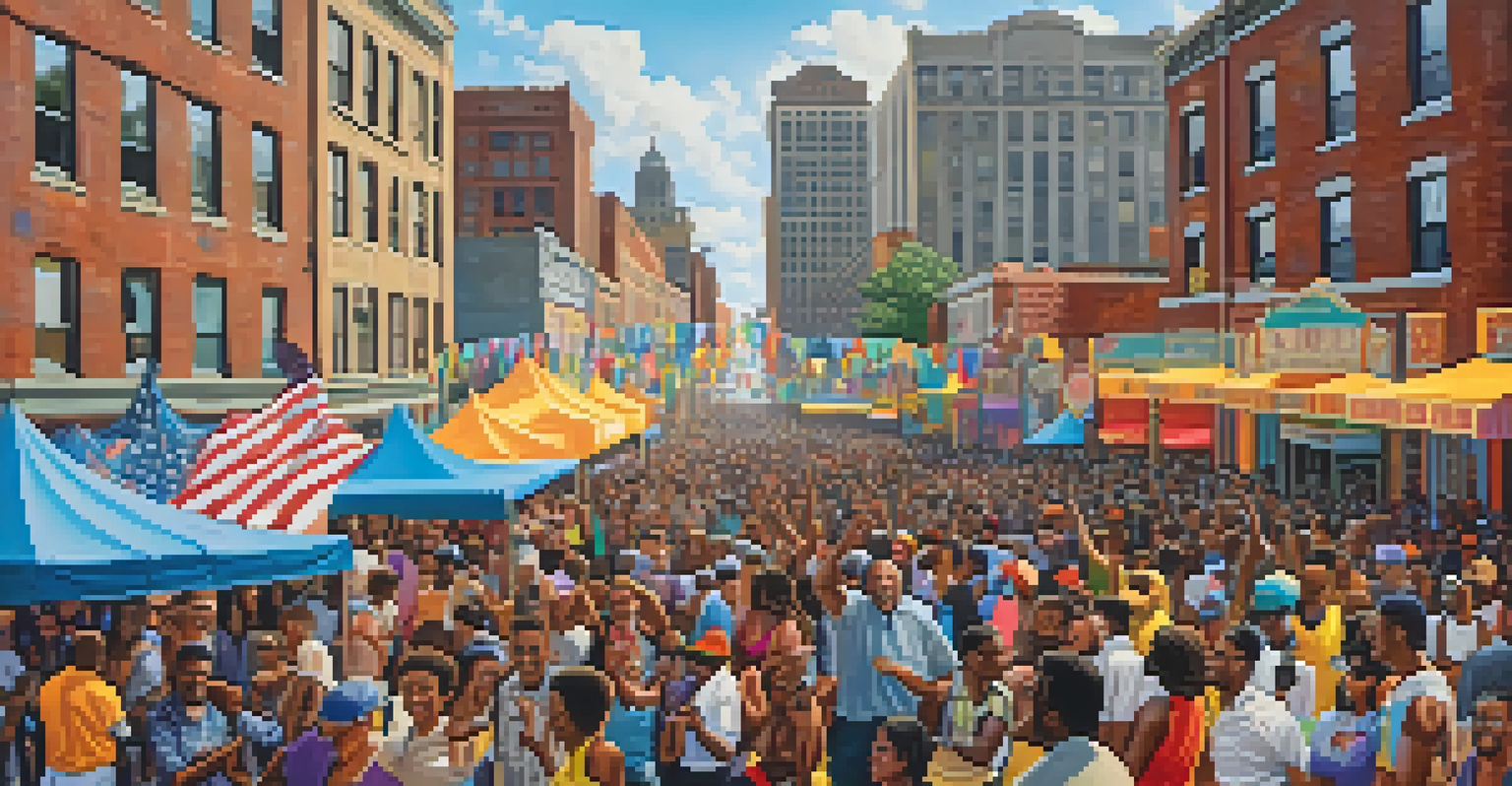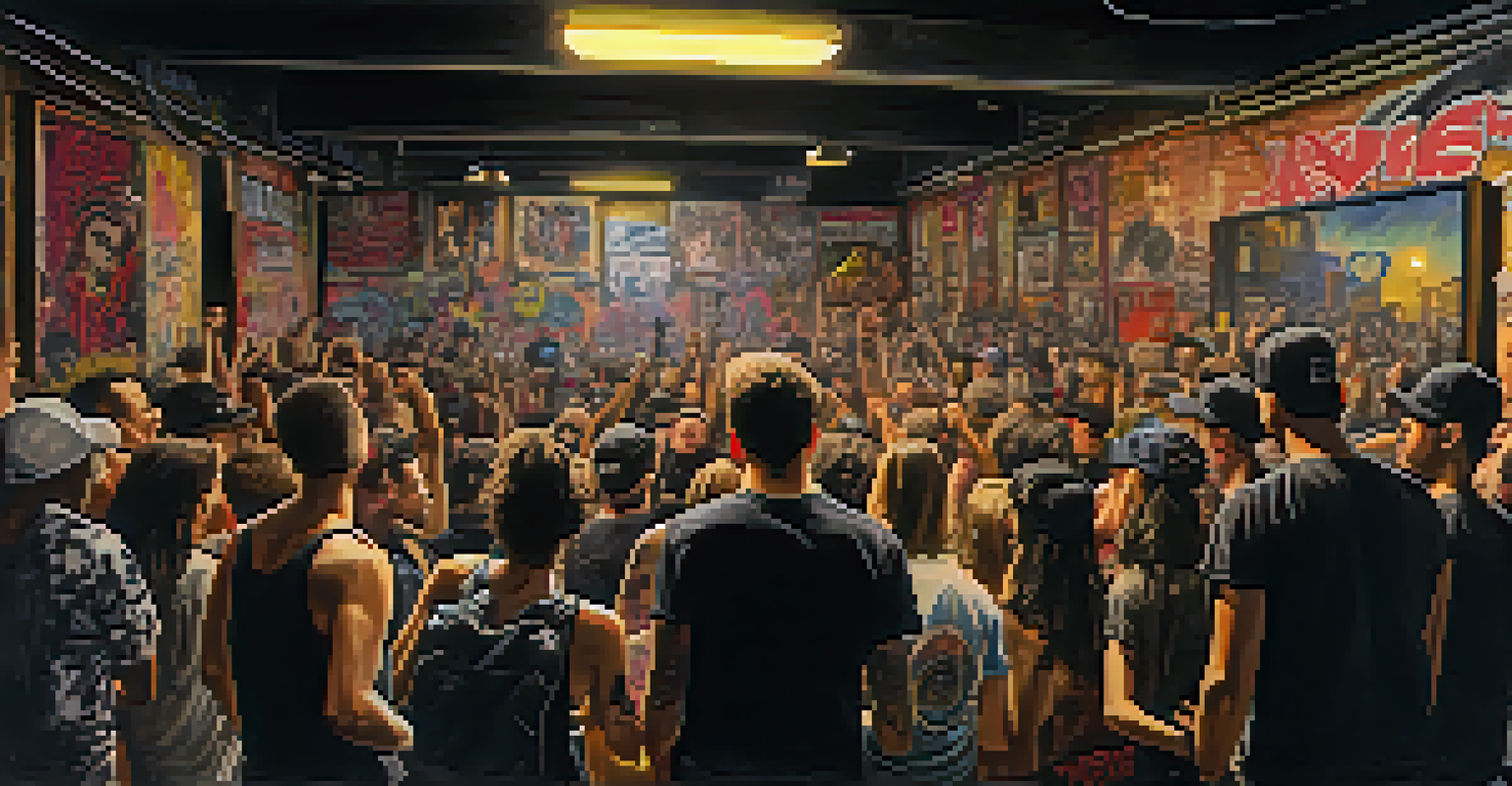From Blues to Hip Hop: Detroit's Evolving Music Heritage

The Birthplace of the Blues: Detroit's Early Influences
Detroit's musical journey began in the early 20th century with the rise of the blues, a genre rooted in African American history. Artists like John Lee Hooker and B.B. King laid the groundwork for a vibrant music scene that resonated with the struggles and joys of everyday life. These blues musicians often performed in local bars and clubs, where their heartfelt lyrics and soulful melodies captivated audiences.
The blues is a feeling. It's a way of life, a way of expressing what you feel inside.
As the blues gained popularity, Detroit became a melting pot of musical styles, attracting talent from across the country. This influx of artists contributed to the city's unique sound, blending the raw emotion of the blues with elements of jazz and gospel. The rich cultural tapestry of Detroit provided a fertile ground for musical innovation, leading to the evolution of various genres.
The influence of blues is still felt in Detroit today, as many contemporary musicians draw inspiration from the legends who paved the way. This legacy is not just a historical footnote; it continues to shape the music scene, creating a bridge between the past and present. The city's blues roots serve as a reminder of its enduring spirit and resilience.
Motown: The Sound of Young America
In the 1960s, Detroit became synonymous with Motown, a record label that revolutionized the music industry. Founded by Berry Gordy Jr., Motown introduced a polished sound characterized by catchy melodies and tight harmonies, which appealed to a broad audience. Iconic artists like The Supremes, Marvin Gaye, and Stevie Wonder helped to define this new genre, making it a staple of American music.

Motown's success was not just about catchy tunes; it represented a cultural movement that transcended race and class. The label's artists became ambassadors of hope and change during a tumultuous time in American history, using their music to address social issues. This blend of entertainment and activism resonated deeply with fans, solidifying Motown's place in the hearts of many.
Detroit: A Musical Melting Pot
Detroit's music scene has evolved through various genres, from blues and Motown to punk, hip hop, and techno, showcasing the city's rich cultural diversity.
Even today, the impact of Motown can be seen across genres, as its influence permeates pop, R&B, and hip hop. The legacy of these artists continues to inspire new generations of musicians, reminding us of the power of music to unite and uplift. In many ways, Motown set the stage for Detroit's ever-evolving sound.
The Rise of Punk Rock in Detroit
As the 1970s rolled in, a new wave of music emerged from Detroit: punk rock. This genre was a reaction against the polished sounds of Motown and mainstream rock, embracing a rawer, more rebellious spirit. Bands like The Stooges and MC5 ignited a punk revolution, paving the way for countless artists to express their discontent through music.
Motown was like a family; we had a lot of love and respect for each other, and we were all dedicated to making great music.
Punk rock in Detroit was not just about the music; it was a cultural movement that reflected the city's socioeconomic struggles. The DIY ethos of punk encouraged artists to create without the constraints of commercialism, leading to an explosion of creativity. Local venues became breeding grounds for this underground scene, where musicians could experiment and push boundaries.
The legacy of Detroit punk is still felt today, influencing various genres and movements. Its spirit of rebellion and self-expression continues to inspire artists around the world, proving that even in challenging times, music can serve as a powerful voice for change. This evolution showcases Detroit's ability to adapt and thrive in the face of adversity.
Hip Hop's Emergence in Detroit
As the 1980s approached, hip hop began to carve out its own niche in Detroit's musical landscape. The genre found a home in the city, resonating with the experiences of urban youth and their desire to tell their stories. Pioneering artists like Esham and ICP (Insane Clown Posse) emerged, blending hip hop with elements of horror and punk, creating a unique sound that set Detroit apart.
The rise of hip hop in Detroit was fueled by the city's rich cultural diversity and the struggles faced by its residents. As artists began to share their narratives through rap, they highlighted issues such as poverty, crime, and systemic inequality. This authenticity resonated with listeners, further establishing hip hop as a vital form of expression within the community.
Legacy of Innovation and Resilience
The city's musical heritage reflects a spirit of creativity and adaptability, inspiring new generations of artists while addressing social issues through their work.
Today, Detroit continues to be a powerhouse in the hip hop scene, producing influential artists like Big Sean and Danny Brown. The evolution of hip hop in the city reflects its resilience and adaptability, showcasing the power of music to bring people together and inspire change. As the genre evolves, it remains deeply rooted in the experiences of those who call Detroit home.
The Influence of Electronic Music in Detroit
In the late 1980s and 1990s, Detroit became a mecca for electronic music, particularly techno. Innovators like Derrick May, Juan Atkins, and Kevin Saunderson, often referred to as the 'Belleville Three,' were instrumental in developing this genre, which combined elements of funk, jazz, and futuristic sounds. Their groundbreaking work laid the foundation for a movement that would ripple across the globe.
Detroit's techno scene was characterized by its underground clubs and vibrant warehouse parties, where creativity and innovation flourished. This subculture attracted a diverse audience, united by a love for the music and the freedom it represented. The city's industrial landscape provided the perfect backdrop for this emerging genre, transforming spaces into pulsating hubs of energy and expression.
Today, the influence of Detroit techno can be felt in countless genres, from pop to hip hop and beyond. The city's commitment to electronic music has solidified its reputation as a cultural capital, attracting artists and fans from all over the world. As techno continues to evolve, it serves as a testament to Detroit's enduring legacy as a trailblazer in the music industry.
The Current Music Scene: A Blend of Genres
As we look at Detroit's current music scene, it's clear that the city remains a hotbed of creativity and innovation. Today's artists are blending genres in exciting ways, drawing from the rich musical heritage that has come before them. This fusion of styles reflects the diverse experiences of the city and its residents, creating a sound uniquely their own.
From indie rock to hip hop and electronic music, Detroit's contemporary artists are not afraid to experiment and push boundaries. Collaborations between genres are commonplace, resulting in fresh sounds that challenge traditional notions of music. This dynamic environment fosters a sense of community, where artists support and inspire one another to create groundbreaking work.
Celebrating Detroit's Music Festivals
Events like the Detroit Music Festival and Movement Electronic Music Festival highlight both local talent and the city's vibrant cultural scene, fostering community and collaboration.
As Detroit continues to evolve musically, its rich heritage serves as both a foundation and a source of inspiration. The city's ability to adapt and thrive in the face of change is a testament to its resilience, proving that music will always be a vital part of its identity. The future of Detroit's music scene is bright, and the world is watching closely.
Celebrating Detroit's Musical Legacy
Detroit's musical heritage is a tapestry woven from the threads of various genres, each contributing to the city's rich cultural fabric. From the soulful blues of the early 20th century to the revolutionary sounds of Motown, punk, hip hop, and techno, the city's music tells a story of resilience and creativity. This legacy is not just a part of the past; it continues to inspire artists and fans alike.
Various festivals and events celebrate Detroit's dynamic music scene, such as the Detroit Music Festival and Movement Electronic Music Festival. These gatherings not only showcase local talent but also draw international attention to the city's vibrant culture. They create opportunities for collaboration and connection, fostering a sense of pride in Detroit's musical achievements.

As we celebrate Detroit's musical legacy, it's essential to recognize the artists who have shaped its history and continue to influence the future. Their contributions serve as a reminder of the power of music to bring people together, inspire change, and foster community. Detroit's evolving music heritage is a testament to the city's enduring spirit and its unwavering commitment to creativity.